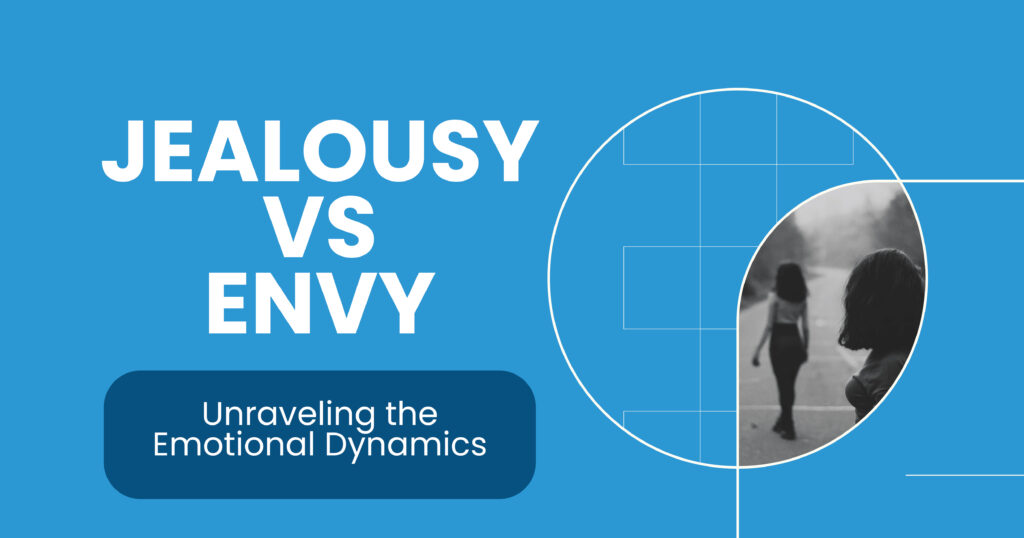Jealousy vs Envy: Understanding the Emotional Differences

Authored By:
Raleigh Souther

Edited By:
Chase Mcquown

Medically Reviewed By:
Dr. Alejandro Alva
- Last Updated:

Your co-worker was given “best employee of the year,” and you are bothered by this fact because you wish that title were yours. Also, you have worked hard and feel like you deserve it. Is that feeling jealousy or envy?
It’s easy to use these two words interchangeably; after all, you might assume they have the same meaning. However, that isn’t the case; they have slight differences based on the feelings and behaviors they evoke. This can include:
- Hostility
- Malicious behaviour
- Desire to sabotage others
Before we give a detailed comparison of jealousy vs envy, you must first have a good understanding of both concepts. This will give you physiological insights into these emotions to help you recognize unhealthy feelings, so you can avoid categorizing them as “normal.”
Defining Jealousy and Envy
Do you feel a churn in your tummy, or are you suddenly anxious when you find your partner getting cozy with someone else? Now, what would you call such an emotion?
The definition of jealousy is pretty straightforward. It is the fear of losing something to someone else. This can include:
- Your partner
- Friends
- Position at work
- Parental attention
Most people link jealousy to possessiveness or insecurity. Jealousy examples are explained below in different contexts
| Context | Jealousy Examples |
| Romantic Relationship | Feeling jealous when your partner is too close to a coworker. |
| Friendship | Being uncomfortable when his best friend starts spending more time with someone else. |
| Sibling dynamics | Displeasure when your sibling receives more attention from your parents |
| Workplace | Jealousy arises when your boss praises someone else because you believe your work will be overshadowed. |
| Social circles | A pang in your heart when your friends hang out without you. |
Now, let’s jump into the emotion of envy and what it means. Envy is the desire to have something that someone else has. It’s focused on wanting what others possess, whether it’s:
- Material
- Personal
- Professional
Envy examples are:
| Context | Envy Examples |
| Academic Achievement | Envy a classmate’s top exam score, thinking “I wish I had those grades” |
| Lifestyle | You envy a cousin’s fancy house and trips |
| Career Success | Envying a colleague’s fast promotion, wishing “That should’ve been me.” |
Jealousy vs envy symptoms can be hard to tell apart. For instance, when my parents turn their attention to a friend from school, are my negative feelings envy or jealousy?
A comparison of jealousy and envy is necessary if you want to spot the difference between the two emotions.
| Aspect | Jealousy | Envy |
| Definition | Fear of losing something you have | Wanting something someone else has |
| Focus | Triangular: involves a third party | Direct: involves you and another person |
| Emotion Trigger | Possessiveness, insecurity, threat of loss | Longing, desire, comparison |
| Example Emotion | “I’m scared they’ll leave me for someone else.” | “I wish I had what they have.” |
| Positive Use | Can signal care or value for a relationship | Can motivate self-improvement |
| Negative Outcome | Can lead to control, mistrust, or resentment | Can lead to bitterness or low self-esteem |
Jealousy and envy can be controlled, especially with healthy coping strategies. Here’s why:
- It’s a learned emotional response, not a fixed trait
- Triggers can be identified and managed
- Thought patterns can be reframed
- Healthy communication can reduce misunderstandings
- Therapy helps uncover root causes and build tools

Historical Context and Cultural Perspectives
Jealousy vs envy are not just modern emotional struggles. They’ve been shaping relationships, power structures, and moral codes for centuries. Across cultures and history, these emotions have been
- Feared
- Moralized
- Weaponized.
Even back then, these emotions were linked to
- Pride
- Punishment
- Inner struggle
While some cultures have moralized envy, others view it as a natural motivator for growth or ambition. Interpretations differ widely and are determined by:
- Values
- Norms
- Social roles.
| Culture/ Context | Jealousy | Envy |
| Ancient Greece | Linked to possessiveness in myths (e.g., Hera’s jealousy of Zeus’s lovers) | Viewed as malicious and socially corrosiveE.g., phthonos was seen as destructive |
| Hinduism | Stemming from attachment and ego | A mental obstacle to spiritual growth |
| Medieval Europe | Romanticized in courtly love | Morally frowned upon |
| Modern Psychology | Relational insecurity | Dissatisfaction from social comparison |
| Pop Culture | Drives romantic plotlines and drama | Fuels competition, jealousy, and FOMO culture |
Psychological Insights into Jealousy
Jealousy is more than a sharp sting of fear, but it’s a complex emotion rooted in:
- Attachment
- Self-worth
- Perceived threats.
When exploring the psychology of jealousy, it’s essential to separate it from envy and view it through the lens of:
- Emotional regulation
- Identity
- Interpersonal dynamics.
The table highlights the key psychological findings on jealousy. This is to help explain why this emotion can feel so powerful and personal:
| Finding | Explanation |
| Triggered by Threats | Arises when a valued relationship or status feels at risk |
| Attachment-Based | Stronger in those with anxious attachment styles |
| Cognitive Biases | Can distort perception, leading to false assumptions or overreactions |
| Self-Esteem Factor | Low self-esteem intensifies jealousy |
| Biological Basis | Involves amygdala activity (threat detection center of the brain) |
| Evolutionary Roots | A survival mechanism to protect emotional bonds |
Emotional Triggers and Causes of Envy
This emotion is built slowly, and you might only notice when envy symptoms begin to show up. They can be:
- Irritation
- Backhanded compliments
- Satisfaction at others’ setbacks
- Hypercriticism
If you are unable to recognize key emotional facts, you may end up harming a beloved friend. They are:
| Factor | Description |
| Reaction to triggers | Your behavioral response, such as withdrawal or criticism. |
| Cause | Based on root issues like insecurity or unmet goals |
| Perception vs Reality | Feeling based on assumptions, not facts |
| Unspoken Expectations | Silent beliefs about what someone “owes” you |
Here are examples of what causes envy and why
| Cause | Explanation |
| Social Comparison | Measuring ourselves against others’ success |
| Insecurity | Feels others’ wins are threatening |
| Lack of Achievement | Envy grows when we feel stuck while others advance |
| Material Differences | Disparities in appearance or wealth |
| Recognition Gaps | Wanting the spotlight of someone else |
Impacts on Relationships and Social Interactions
It is safe to assume that you might not like someone going through your phone or always interrogating you because they feel jealous. This reaction can even imply that they don’t trust you, which, of course, can wreck any relationship.
Here is a table that outlines how each emotion can shape relationships
| Emotion | Impact on Relationships | Impact on Social Behavior |
| Jealousy | Strains trust and relationships | May lead to possessiveness, suspicion, or isolation |
| Jealousy | Triggers emotional outbursts | Leads to controlling behaviors |
| Jealousy | May cause emotional manipulation | Avoidance of open communication |
| Envy | Creates distance and resentment | Can cause gossip or passive aggression |
| Envy | Undermines appreciation and support | May result in self-comparison and withdrawal |
| Envy | Can reduce empathy | Diminish others’ achievements |
Coping Mechanisms and Emotional Management
Negative emotions aren’t the end of the world, and with a little effort, you can control them. A social comparison theory by Leon Festinger in 1957 shows that these emotions can be redirected into
- Self growth
- Better awareness of personal values
- Goal setting
Some coping Tools for both jealousy and envy are:
| Tool | How It Helps |
| Name the emotion | Builds awareness and breaks automatic reaction cycles |
| Challenge negative thoughts | Reduces emotional spirals |
| Practice gratitude | Shifts focus from lack to appreciation |
| Limit social media | Minimizes comparison triggers |
| Focus on personal goals | Encourages self-direction over external validation |
| Talk to someone neutral | Offers an outside perspective |
| Reframe the comparison | Turns envy into motivation for self-growth |
| Develop emotional awareness | Helps identify triggers and emotional patterns |
| Use deep breathing | Physiological responses to emotional stress |
| Seek therapy if persistent | Provides structured tools for long-term change |
Learn More About Emotions at Visalia Recovery Center
Struggling with jealousy, envy, or other overwhelming emotions? You don’t have to struggle with it. Visalia Recovery Center offers support to help you navigate emotional challenges with clarity. We provide
- Intensive outpatient programs
- Flexible scheduling
- Evidence-based therapies
- Aftercare support
- Confidential, non-judgmental environment
So contact Visalia Recovery Center today to take that first step towards recovery.

FAQs
What is the difference between envy and jealousy in psychological terms?
Let’s explain this concept in simple terms. If your friend has a car you want, then you are envious. But jealousy is worrying over a relationship ending due to someone else.
How do jealousy and envy manifest differently in emotions?
Jealousy is a milder emotion compared to envy. Anxiety, suspicion, insecurity, and even anger are bound to show up in jealous people. If you are feeling resentment because your friend is richer, or yearning for that award a coworker received, then you are envious.
Can you provide examples that highlight the distinction between jealousy vs envy?
“I don’t like that my best friend is getting too close to another.” This is a great example because it shows that you are afraid of losing your friend to another person. However, envy is desiring something that was never yours to begin with. “Jack has the best fleet of cars. I wish they were mine.” This distinction clarifies jealousy vs envy
What are some common synonyms for jealousy and envy?
Jealousy symptoms include possessiveness in relationships or distrust. While with envy, you want to covet others’ belongings.
How do the definitions of jealousy and envy differ, and what do they mean in everyday contexts?
That emotional alarm that goes off when you feel someone is about to take what is yours, that is jealousy. Envy is when someone else has what you wish for.


